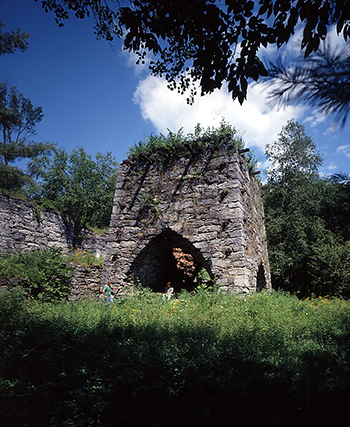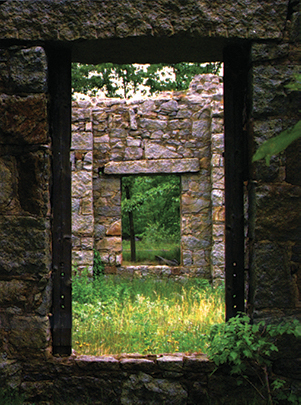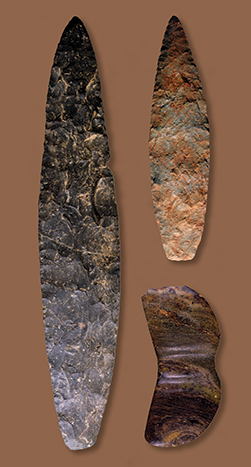Saving Archaeological Lands
Download a copy of Saving the Past for the Future - An introduction to saving archaeological lands. (PDF)
Archaeological Sites

There is hardly a place in Massachusetts where some trace of ancient land use does not remain. Some sites have visible indications: the foundations of 18th-century grist mills, the cellar holes and stone walls of abandoned farmsteads, the glacial rock overhangs used to shelter Native American campsites.
In other places, the remains of human occupation are buried or embedded in the ground. Traces of earlier occupation may lie under parking lots, buildings, or plowed fields. With Native American sites in particular, the archaeological remains themselves are subtle, consisting of stone tools, ceramics and bone, or even mere soil stains resulting from past activities. Many sites are invisible from the surface and are only discovered through an archaeological survey, including the excavation of test pits.
Archaeological sites frequently occur in places valuable for other open space qualities. In particular, areas of high ecological diversity with important natural resources were particularly attractive to populations living off the land. Archaeologists and land conservationists share a mutual interest in properties valued for their ecological assets.
Conserving Archaeological Lands
Archaeological sites are fragile, unique, and non-renewable. In Massachusetts, sites are being destroyed at an alarming rate, and unless land owners take positive steps to preserve these properties, entire pieces of Massachusetts history will be lost forever.

Passive conservation, maintaining land as open space in its existing, natural condition, is responsible archaeological stewardship. Passive conservation of a site can become a family tradition, but subsequent owners may not be aware of the site or care to protect it. Both archaeologists and land trusts are readily available to help landowners develop alternatives for the preservation of archaeological lands. The Massachusetts Historical Commission and land trusts, private charitable conservation organizations, can provide reliable information on various options to conserve land.
Preservation and Conservation Restrictions: Landowners who desire to protect their sites permanently may donate a preservation or conservation restriction on the site to a land trust or historical organization. These restrictions are perpetual legal agreements recorded with the deed for the property; they extinguish or limit development rights that would otherwise harm the archaeological site. The landowner continues to own the land, but the holder of the restriction has the legal right and responsibility to enforce the restriction and protect the site. The donation of a preservation or conservation restriction to a qualified organization is considered a charitable gift, and may result in income tax, estate tax, or property tax savings for landowners and their heirs.

Gifts of Land: Landowners may also make an outright donation of an archaeological site to a land trust or historical organization, placing the responsibility for managing the site on an organization better equipped to ensure its safekeeping and wise use. Many groups, however, require that adequate provisions be made to defray management costs. A gift of land to a nonprofit organization is a charitable donation, likely to result in tax savings.
Archaeological Excavation: Landowners may decide to preserve the information contained in the archaeological site by agreeing to a scientific excavation of the site by qualified archaeologists. Landowners should be aware, however, that excavation is itself a destructive process. Once a site is excavated, it is gone forever. The site must be professionally excavated the first time, because there will be no second chance. Scientific excavation is time and staff intensive and may be prohibitively expensive. Conservation by the means discussed here is a less expensive option.
National Register of Historic Places: If an archaeological site meets criteria for significance and integrity, the property can be listed in the National Register of Historic Places, the nation’s list of historic properties worthy of recognition and preservation. While such listing does not restrict a private landowner’s uses of the site, it does trigger a review of any federal or state projects that might affect the site.
Caring for Archaeological Sites: Some Dos and Don’ts
- DO report the site to the Massachusetts Historical Commission. Your report will not trigger any land use restrictions, but will aid in scientific research and preservation planning.
- DO maintain the site in its natural condition and protect it from inadvertent destruction.
- DO keep permanent records of any casual or surface finds, including noting as exact a horizontal and vertical location as possible.
- DO deposit archaeological artifacts and collections with an appropriate museum or curatorial facility.
- DO learn more about your site and other nearby sites. Begin by studying the history of your property and your neighborhood to develop an appreciation of the variety of uses and occupations of the area over many thousands of years. Encourage scholarly research to interpret the ancient and historic assets of your property.
- DO protect your site and ensure its survival for future generations by placing a preservation or conservation restriction on the site.
- DO post the property against trespass and against destruction of natural and cultural resources.
- DO NOT allow unqualified persons to “dig” the site. Report any unauthorized excavation—“looting”—to the State Archaeologist at the MHC.
- DO NOT construct buildings; place trails, picnic areas, or recreational areas; or conduct any earth moving or construction in the immediate vicinity of the site.
- DO NOT mark the exact site location with signs. This invites vandalism and looting.
Archaeology in Massachusetts

Archaeological sites are valuable places in the modern landscape where we can experience a tangible link to the past. Most sites in Massachusetts are privately owned. They will be preserved through the generosity of private landowners, or not at all.
Human groups have lived in Massachusetts since the last glacier retreated nearly 12,000 years ago. Since then, people have lived in or used almost every place in Massachusetts at some time, often repeatedly. Because people usually modify the land in which they live, traces of ancient human occupation survive from the past to the present—traces that are frequently buried and obscured.
Archaeologists study the everyday lives of our forbearers through the traces and artifacts they left behind. Archaeologists glimpse the record, not of the heroes of history, but of all people—grand and ordinary. Archaeology describes and compares the different ways people have chosen to live in a changing world for the whole of human history. It provides us with a global perspective of our place in the world.
Archaeology is the sole source of information about peoples who have lived in Massachusetts, but have left no written record. Although we commonly associate archaeology with the pre-Colonial period, it is a discipline that studies all of human history including relatively recent times. Archaeologists study populations often neglected or underrepresented in traditional historical studies: poor people, women, immigrant populations, African Americans, and other minorities.
Many archaeologists study the human ecology of past societies—how human groups coped with the stresses of changing environments. Other scientific disciplines benefit from archaeological investigations, which include the reconstruction of past climates and the evolution of plant and animal species. Archaeologists want to know how people lived; what they ate and how they prepared it; what they believed in; how they organized their families, economies, and governments; what made their lives meaningful; and how and why cultures change over time. The answers to many of these questions are preserved in the land and open spaces of the Commonwealth and are worthy of protection.
Please consider taking steps to preserve the archaeological sites on your property so future generations may enjoy the knowledge they contain.
Contact the MHC for more information and assistance in archaeological site conservation:
Massachusetts Historical Commission
220 Morrissey Blvd.
Boston, MA 02125